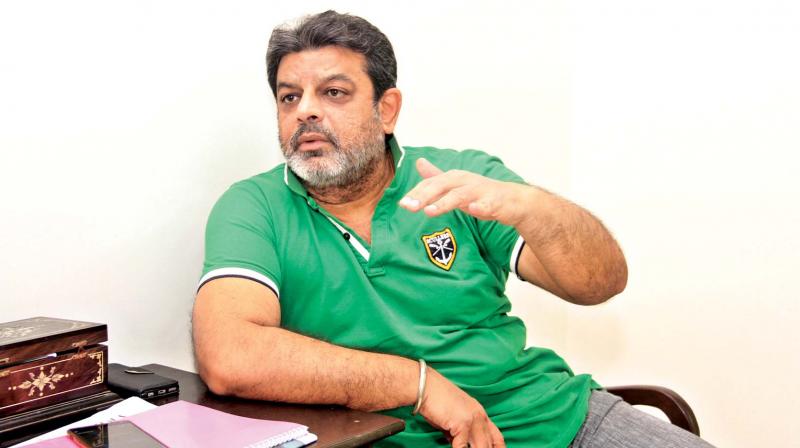Tamil Nadu: Theatre is your ideology, not for it, says Vinay Varma

Chennai: Stoutly defending the autonomy of ‘theatre’ and the timeless dimension to it, Vinay Varma well known theatre personality, actor, director and script-writer and the moving spirit behind Hyderabad-based ‘Sutradhar’, is not for playing to the gallery, more so on the tenuous links between politics, ideology and theatre.
“For me theatre is not propaganda,” says Vinay Varma with a quiet confidence and conviction of a thorough professional as a theatre person, who has also been training a number of actors for the stage and imparting other related skills like voiceover training on his wide ‘Sutradhar’ platform.
For over 35 years now, the stage is the beginning of his world. But Vinay, who is more comfortable with Indian languages including Hindi than English, has fully realised the import of having to wear many masks when one goes on stage, as the script of the play would require it.
Personally, one may be wedded to a particular political ideology or rooted in a religious faith. “These are only personal,” mused Vinay, in a chat with Deccan Chronicle here on Wednesday. He is in Chennai for staging one of his political plays this weekend, ‘Five’, scripted by Srikumar Verma.
But “theatre is not about propagating any ideology,” he sounded categorical. On the contrary, “theatre is your ideology; I am going purely by the script.”
Taking a more structuralized-functionalist view, Vinay asks forthrightly, “when Bharat Muni wrote the ‘Natya Shastra, what ideology was there?’ Ideologies come and go, but ‘theatre’ goes on for ever, he reflects.
That for Vinay is the ageless quality and beauty of ‘theatre’ itself as a “primal, basic, purest form of human communication; it is live, the vibrations with its audience is it’s connect,” Vinay explained to drive home its non-temporal dimension.
Nevertheless, situated in a historic context as all plays are, “when ideologies come, they (the message-bearers) started using theatre,” says Vinay with astonishing brilliance and lucidity. Every time you act, for Vinay, it is a reaffirmation of the human soul, the common bond of humanity, with the audience. “I say you are reborn in every enactment of a play,” he says, queerly adding, every play is like a life-death cycle.
“The character is dead after a play,” until he goes up on stage again. “We are all playing roles, every day, different roles at different levels, in different capacities. It is the same thing with actors,” elaborated Vinay Varma, with a dramatic one-liner, “lights off, curtains down, it’s over.”
Aren’t you talking of ‘Nishkaama Karma’ that Lord Krishna had spoken about to Arjuna? “That’s what someone told me (about my experiments with theatre),” he supplements modestly. It requires a certain kind of awareness that “life on stage is another life.”
In the same breath, for Vinay Varma, it does not mean that there is no political role for theatre at all. ‘Nothing is apolitical in life; when there is politics even in the family, how can there not be politics in theatre?” he counter-poses. But it all depends on how discerning you are in being able to distance from the political subject you may happen to talk about in a particular play, nuances Vinay. “But don’t make it propagandist unless you are a hardcore party person,” he smiles.
Rather, Vinay, who won worldwide accolades for playing the unsung secular writer and hero Rahi Masoom, who lambasted religious fundamentalists of all shades, situates the purpose of ‘theatre’ in the larger context of its organic links to culture. Rahi was daringly telling all religious fanatics to get lost.
“Unless folk arts are preserved, we can’t talk about anything,” says Vinay. “If theatre is gone, culture is gone; it is an integral part of it, taking to the people, the value-systems, the ethos that we have as Indians,” he says. All plays, including mythological ones, fall under this genre.
“The audience paradigm of a something difficult-to-define relationship has to go on,” comes out Vinay in his metaphorical best. It is in that sense that ‘theatre’ brings awareness, “takes you back in time, giving knowledge or information at least,” is how Vinay sums up how ‘theatre’ transcends the political. It also complements the other visual arts like cinema today.
Discussing current political issues, the unease in the dialogue comes through, but with no sense of cynicism. “Hyderabad is a mini-India,” quips Vinay Varma, adding, people from different religions and from different parts of the country who have made it their home, have been able to retain their respective festivals, rituals and their mother tongue.
The perceived threat to “our multi-cultural cosmopolitan outlook” is a bit hyped up, feels Vinay Varma. The creative artist in him rounds off quoting the famous couplet from Allama Iqbal, to drive home that our country has a very strong secular fabric and it cannot be taken over by religious fanatics.
“Kuch baat hai ki Hasti Mitti Nahi hamari, Sadiyon Raha hai Dushman daure-e-Zaman Hamara,” he rhyms the lyrical Urdu couplet. “There is some strength within our people, we don’t get destroyed, though for ages the whole world has been our enemy,” Vinay Varma added in ringing in its message.

